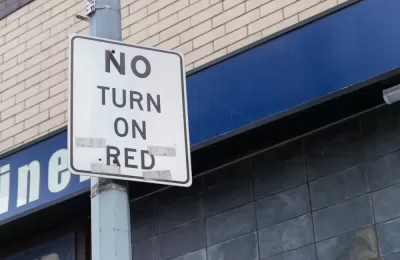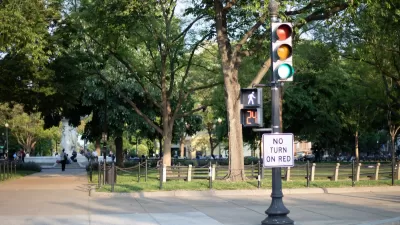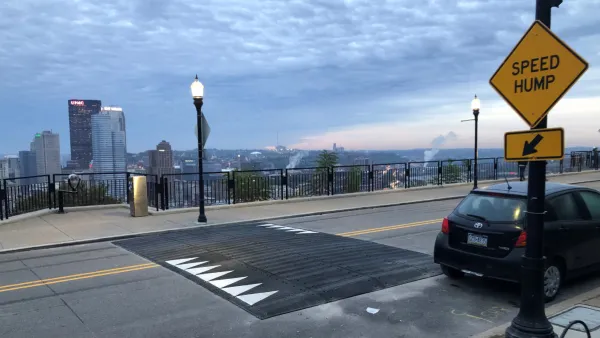How road safety activists passed a law that could make roads much safer.

In a piece for the Vision Zero Cities Journal republished in Streetsblog USA, Rebecca Serna and Jason Dozier outline how Atlanta, Georgia passed a ban on right turns on red this February in an effort to make streets in three central neighborhoods safer for pedestrians.
As the authors explain, “Research shows that turning right on red poses significant risks to people who are most vulnerable in crashes: people getting around by foot, wheelchair, and bicycle. As drivers make right turns on red lights, their attention is focused on oncoming traffic from their left — not on people walking across the street or waiting in the bike lane on their right. With their attention elsewhere, drivers are more likely to turn into people outside of cars who have the pedestrian signal to cross.”
Planetizen has covered right turns on red in previous pieces, noting that allowing right turns on red lights was largely a result of the 1970s energy crisis. However, transportation planners and policymakers are now recognizing its negative impact on road safety and working to reverse the laws that allows these turns.
In Atlanta, 65 fatalities and serious injuries occurred at intersections with legal right turns on red in the last nine years, with close to half of them happening while drivers were turning right at red lights. The effort to ban them was led by city council member Jason S. Dozier, who urged fellow council members — some of whom have experienced close calls as pedestrians themselves — to support the ban. “In an unexpected turn, we also found allies in councilmembers who drove some of the largest vehicles, who supported the effort due to near-misses they’d experienced with pedestrians.”
According to the authors, “Atlanta’s new no-right-on-red policy is a step towards real, measurable change in pedestrian safety. It’s also a chance to live out our declared values as a city that is both pedestrian-friendly and supportive of sustainable and safe ways of getting around.”
FULL STORY: How Atlanta Passed Its Right-On-Red Ban

Planetizen Federal Action Tracker
A weekly monitor of how Trump’s orders and actions are impacting planners and planning in America.

Congressman Proposes Bill to Rename DC Metro “Trump Train”
The Make Autorail Great Again Act would withhold federal funding to the system until the Washington Metropolitan Area Transit Authority (WMATA), rebrands as the Washington Metropolitan Authority for Greater Access (WMAGA).

DARTSpace Platform Streamlines Dallas TOD Application Process
The Dallas transit agency hopes a shorter permitting timeline will boost transit-oriented development around rail stations.

Renters Now Outnumber Homeowners in Over 200 US Suburbs
High housing costs in city centers and the new-found flexibility offered by remote work are pushing more renters to suburban areas.

The Tiny, Adorable $7,000 Car Turning Japan Onto EVs
The single seat Mibot charges from a regular plug as quickly as an iPad, and is about half the price of an average EV.

Supreme Court Ruling in Pipeline Case Guts Federal Environmental Law
The decision limits the scope of a federal law that mandates extensive environmental impact reviews of energy, infrastructure, and transportation projects.
Urban Design for Planners 1: Software Tools
This six-course series explores essential urban design concepts using open source software and equips planners with the tools they need to participate fully in the urban design process.
Planning for Universal Design
Learn the tools for implementing Universal Design in planning regulations.
Municipality of Princeton
Roanoke Valley-Alleghany Regional Commission
City of Mt Shasta
City of Camden Redevelopment Agency
City of Astoria
Transportation Research & Education Center (TREC) at Portland State University
US High Speed Rail Association
City of Camden Redevelopment Agency
Municipality of Princeton (NJ)





























